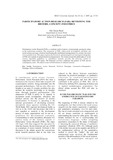| dc.contributor.author | Reza, Md. Hasan | |
| dc.date.accessioned | 2010-10-10T04:10:43Z | |
| dc.date.available | 2010-10-10T04:10:43Z | |
| dc.date.issued | 2007 | |
| dc.identifier.uri | http://hdl.handle.net/10361/396 | |
| dc.description.abstract | Participatory Action Research (PAR), a dominant mode of praxis, is increasingly gaining its status in the mainstream academia. The uniqueness of PAR, where social investigation, education and social actions converge, aimed at transforming the institutional arrangements of a society into more of an equitable form. This paper explores the historical, epistemological and ideological standpoints of PAR and explains its propositional encompassments. The debate around the philosophy of social science, especially qualitative vs. quantitative research, provides the necessary context to comprehend where PAR stands. The historical overview explicates the genesis of PAR and its contemporary status. The ethical issues in PAR indicate its inherent tensions. | en_US |
| dc.language.iso | en | en_US |
| dc.publisher | BRAC University | en_US |
| dc.relation.ispartofseries | BRAC University Journal, BRAC University;Vol.4, No.2,pp. 27-34 | |
| dc.subject | Participatory action research | en_US |
| dc.subject | Positivist paradigm | en_US |
| dc.subject | Constructivist/interpretive Paradigm | en_US |
| dc.subject | Ethics in research | en_US |
| dc.title | Participatory action research (PAR): revisiting the history, concept and ethics | en_US |
| dc.type | Article | en_US |

